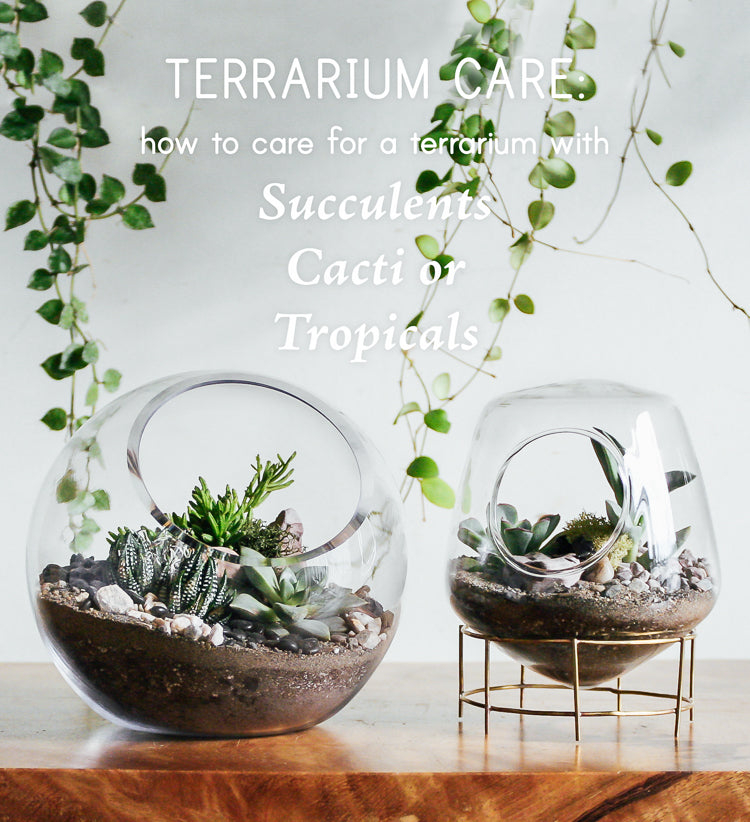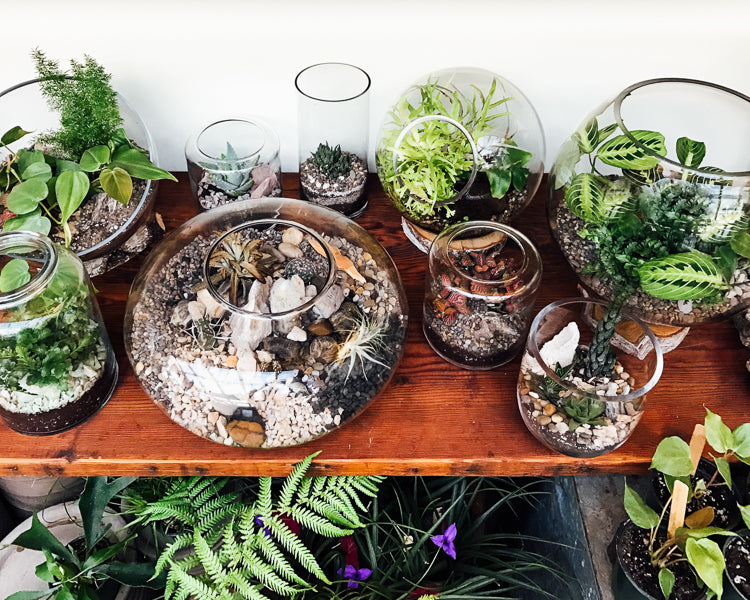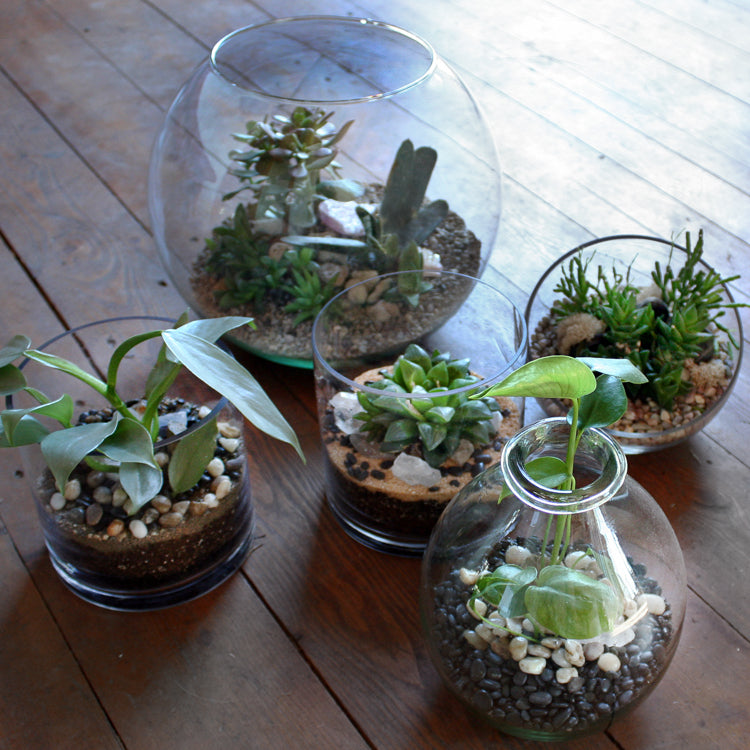Terrarium Care: How To Care For A Terrarium with Succulents, Cacti and Tropical Plants
Terrariums, whether created with succulents, cacti or tropical plants, are like tiny universes. There is something fascinating and beautiful about a self-contained plant landscape within a glass vessel, and when properly assembled and cared for, these little ecosystems will thrive for years. Terrarium care might seem daunting, but there's no reason to be worried - with a few easy steps, you'll get your terrarium happy.
Here's how to care for a terrarium. We'll break it down by the three common plant types used in terrariums - succulents, cacti and tropicals.

Before we delve into terrarium care, though, it's important to identify what type of terrarium you have.
The first type of terrariums -- the type we sell in our retail and web shops, and the most common and easy to care for -- are "open" terrariums. These are glass vessels with an opening that allows air circulation and through which you'll care for your plants. For the purposes of this article, we're going to detail care for open terrariums.
The second type of terrarium - a "closed" terrarium - is a bit more complicated to maintain and less common. That's because the glass doesn't have large enough hole through which to provide regular care. These enclosed terrariums act more like self-sustaining universes, and require a bit more precise and specialized knowledge to set up. If you have a closed terrarium, there are all kinds of great resources around the web detailing their care.

How to Care For a Terrarium with Succulents
Succulents -- plants with thick, fleshy foliage and stems that store water -- are by far the most common plants seen in terrariums. This makes a lot of sense, because succulents are typically comfortable not receiving too much water, and don't need much root space to thrive, making them perfect for small enclosures. Plus, many species stay small and compact, allowing them to live for years in a terrarium without transplanting.
Here's how to care for this type of terrarium
- Light: Save for some lower-light tolerant species like Haworthia and Gasteria, most succulents prefer bright, if not direct, light. Place your succulent terrarium in a very bright spot, keeping in mind that glass tends to magnify direct sun, and can potentially burn your plants.
- Water: Succulents are drought tolerant plants, and are highly susceptible to root-rot. Combined with the fact that terrariums do not have drainage holes, you'll want to water your succulent terrarium very sparingly, when the soil has gone almost completely dry. Water sparingly around the base of each plant using a watering can or a spray bottle. Most succulents will tell you when it's time to water by puckering slightly in their leaves. This is a great indicator for when it's time to water your terrarium
- Troubleshooting: Shriveled leaves? Time to water. Mushy, brown or black leaves? You're watering too much. Remove these plants and replace with comparable specimens, taking care not to water quite as much. Reduce watering during winter.
How to Care For a Terrarium with Cacti
All cacti are succulents, but not all succulents are cacti. The cacti that most folks are familiar with come from the desert. For a terrarium with cacti, you can follow identical instructions for your succulent terrarium, detailed above, with a few adjustments:
- Cacti tend to be even more susceptible to rot than succulents. Take extra care not to over-water.
- Cacti need very bright light to thrive. They should be fine to receive direct light.
- As always, there are exceptions to the above rules. "Jungle cacti" like Rhipsalis, Hatiora and Epiphyllum, will not like bright light, and prefer more water than most cacti. For best results, plant jungle cacti in their own enclosure, or with other lower-light tolerant succulents.
How to Care For a Terrarium with Tropicals
Tropical terrariums are a whole different ball-game. We recommend choosing easy-going, moisture-loving species like philodendron, fittonia and ferns. Tropicals are going to eventually outgrow their terrarium enclosure, so keep in mind that you'll eventually need to transplant.
Here's how to care for a tropical terrarium:
- Light: Most tropicals like medium-bright indirect light. They will burn if they get too much direct sun, especially when the sun is intensified through a glass vessel.
- Water: Though not as drought-tolerant as succulents and cacti, care still needs to be taken not to over-water your tropical terrarium. Allow the top inch or so of the soil to go dry between waterings, and water at the base of each plant using your watering can or spray bottle. Between waterings, feel free to give your terrarium a spritz from a mister to promote a humid environment. Let the leaves tell you when it's time to water by allowing them to wilt slightly between waterings.
- Troubleshooting: Wilted or crispy brown leaves? Time to water. Mushy stems or lots of yellow? You're watering too much. Remove damaged or overgrown plants and replace with comparable specimens. Reduce watering during winter.

Any questions about terrarium care? Ask us in the comments and share your stories. We'll respond with answers as soon as possible! Happy terrarium gardening!

